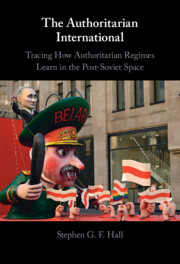39 results
8 - How External and Internal Informal Networks Shape Learning in Belarus, Moldova, Russia, and Ukraine
-
- Book:
- The Authoritarian International
- Published online:
- 11 May 2023
- Print publication:
- 25 May 2023, pp 173-194
-
- Chapter
- Export citation
5 - Learning from External and Internal Success
-
- Book:
- The Authoritarian International
- Published online:
- 11 May 2023
- Print publication:
- 25 May 2023, pp 103-126
-
- Chapter
- Export citation
2 - Measuring Authoritarian Tendencies in Belarus, Moldova, Russia, and Ukraine
-
- Book:
- The Authoritarian International
- Published online:
- 11 May 2023
- Print publication:
- 25 May 2023, pp 33-47
-
- Chapter
- Export citation
4 - Learning from Internal Failure
-
- Book:
- The Authoritarian International
- Published online:
- 11 May 2023
- Print publication:
- 25 May 2023, pp 76-102
-
- Chapter
- Export citation
Bibliography
-
- Book:
- The Authoritarian International
- Published online:
- 11 May 2023
- Print publication:
- 25 May 2023, pp 209-263
-
- Chapter
- Export citation
Preface
-
- Book:
- The Authoritarian International
- Published online:
- 11 May 2023
- Print publication:
- 25 May 2023, pp ix-xxi
-
- Chapter
- Export citation
Contents
-
- Book:
- The Authoritarian International
- Published online:
- 11 May 2023
- Print publication:
- 25 May 2023, pp v-v
-
- Chapter
- Export citation
1 - Introduction
-
- Book:
- The Authoritarian International
- Published online:
- 11 May 2023
- Print publication:
- 25 May 2023, pp 1-32
-
- Chapter
- Export citation
6 - The Role of Regional Organisations in Authoritarian Learning
-
- Book:
- The Authoritarian International
- Published online:
- 11 May 2023
- Print publication:
- 25 May 2023, pp 127-143
-
- Chapter
- Export citation
Index
-
- Book:
- The Authoritarian International
- Published online:
- 11 May 2023
- Print publication:
- 25 May 2023, pp 264-272
-
- Chapter
- Export citation
Abbreviations
-
- Book:
- The Authoritarian International
- Published online:
- 11 May 2023
- Print publication:
- 25 May 2023, pp xxvii-xxviii
-
- Chapter
- Export citation
Notes on Transliteration
-
- Book:
- The Authoritarian International
- Published online:
- 11 May 2023
- Print publication:
- 25 May 2023, pp xxv-xxvi
-
- Chapter
- Export citation
Tables
-
- Book:
- The Authoritarian International
- Published online:
- 11 May 2023
- Print publication:
- 25 May 2023, pp vii-viii
-
- Chapter
- Export citation
3 - Learning from External Failure
-
- Book:
- The Authoritarian International
- Published online:
- 11 May 2023
- Print publication:
- 25 May 2023, pp 48-75
-
- Chapter
- Export citation
7 - External and Internal Learning in State Institutions
-
- Book:
- The Authoritarian International
- Published online:
- 11 May 2023
- Print publication:
- 25 May 2023, pp 144-172
-
- Chapter
- Export citation
Figures
-
- Book:
- The Authoritarian International
- Published online:
- 11 May 2023
- Print publication:
- 25 May 2023, pp vi-vi
-
- Chapter
- Export citation
9 - Conclusion
-
- Book:
- The Authoritarian International
- Published online:
- 11 May 2023
- Print publication:
- 25 May 2023, pp 195-208
-
- Chapter
- Export citation
Acknowledgements
-
- Book:
- The Authoritarian International
- Published online:
- 11 May 2023
- Print publication:
- 25 May 2023, pp xxii-xxiv
-
- Chapter
- Export citation
Copyright page
-
- Book:
- The Authoritarian International
- Published online:
- 11 May 2023
- Print publication:
- 25 May 2023, pp iv-iv
-
- Chapter
- Export citation

The Authoritarian International
- Tracing How Authoritarian Regimes Learn in the Post-Soviet Space
-
- Published online:
- 11 May 2023
- Print publication:
- 25 May 2023



